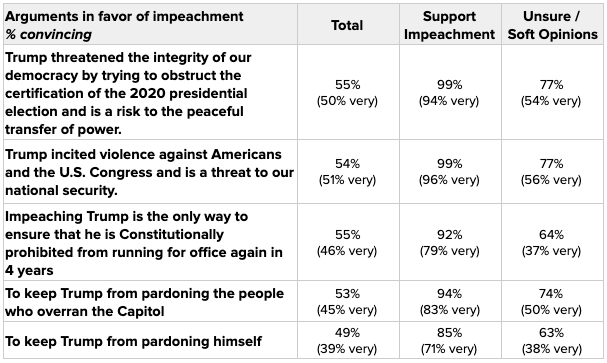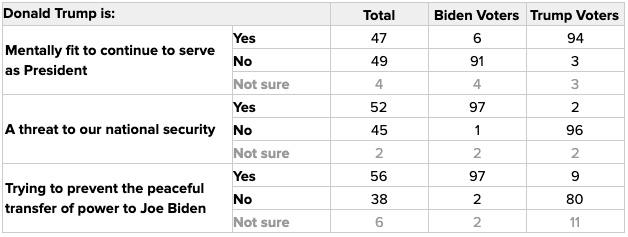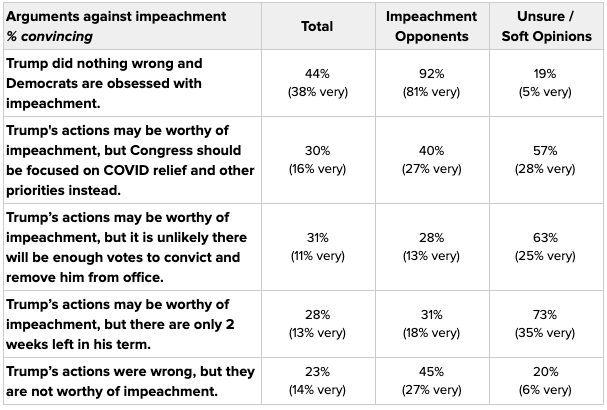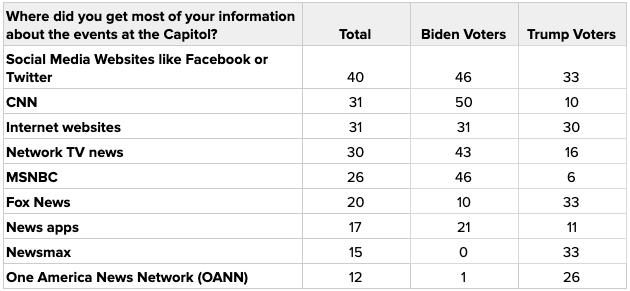Change Research National Poll: January 7-8, 2021
Key Takeaways
Change Research surveyed 2020 voters nationally to understand their reaction to the tragic events at the Capitol and how lawmakers may respond. Below are the key findings.
- 89% disapprove of those who took over the Capitol, including 78% of Trump voters. Voters describe them as domestic terrorists (57%), Trump supporters (54%), and criminals (50%); 70% of Trump voters blame ANTIFA, but their other survey responses suggest this is disingenuous.
- 57% say Trump carries blame for the events at the Capitol, including 10% of Trump voters, and 66% blame congressional Republicans, including 32% of Trump voters. The greater blame assigned to congressional GOP suggests dissatisfaction with the certification vote: 56% say they would certify the results, but 81% of Trump voters say they would not certify.
- 55% of voters acknowledge Biden is the legitimate winner but the myth of Trump’s victory has deep roots: 34% of voters, including 74% of Trump voters, continue to believe Trump won.
- 70% say Capitol Police treated those who entered the building with too little force and 56% say they would’ve been more prepared and more forceful towards BLM supporters.
- 52% support the Cabinet invoking the 25th Amendment to remove Trump. Impeachment and removal was not a majority position in early January 2020, but 51% support impeaching and removing Trump and 3% are unsure. The top reasons for impeachment and removal are:
Trump threatened the integrity of our democracy by trying to obstruct the certification of the 2020 presidential election and is a risk to the peaceful transfer of power.
Trump incited violence against Americans and the U.S. Congress and is a threat to our national security.
- The greatest challenge in the removal effort is deep concern about more violence: 53% say Trump is comfortable using violence to achieve his goals, 58% are concerned about violence from Trump supporters, and voters are split evenly over which is the greater threat between allowing Trump to remain in office (49%) or a violent backlash to a removal attempt (51%).
- 58% support censuring and possibly removing Republican Members of Congress who supported or assisted the actions of those who entered the Capitol. The greater appetite for punishment of congressional Republicans says something about the relevance of Trump’s impending departure and the understanding that the threat doesn’t end with him.
Majorities of Biden and Trump voters are following the insurrection story closely, disapprove of the actions of those involved, and consider them domestic terrorists.
- 88% of voters are closely following ‘the news of individuals taking over the Capitol building on Wednesday in opposition to Congress certifying the results of the 2020 presidential election’ closely. Biden voters are more engaged with this story than Trump voters: 97% following closely and 81% following closely, respectively. Just 3% of voters say they are not following this story at all.
- 89% of voters following this story disapprove of the actions of those who took over the Capitol, with 75% strongly disapproving. Biden voters universally disapprove and 78% of Trump voters disapprove, including half who strongly disapprove.

- Voters describe the people who overtook the Capital as domestic terrorists (57%), Trump supporters (54%), criminals (50%), and right-wing extremists (50%). Biden voters are most likely to call them Trump supporters (92%), domestic terrorists (87%), right-wing extremists (84%), and white supremacists (83%). There is less agreement among Trump voters, but they are most reluctant to acknowledge that these are white supremacists (6%), Trump supporters (14%), or right-wing extremists (14%); 70% of Trump voters describe them as ANTIFA, but their responses to other questions betray their motivation to deflect blame.

A majority, including 1-in-10 Trump voters, blames Trump for the actions of the people at the Capitol, and an even larger majority blames congressional Republicans.
- 57% of voters believe Trump carries blame for the events at the Capitol (51% a lot of blame, 5% some), including all Biden voters and 10% of Trump voters. A 34% minority believe Trump has no responsibility at all, including 73% of Trump voters. Only 6% of voters say that the video Trump tweeted during the siege saying “we love you, you’re very special” was helpful, and a 53% majority, including 7% of Trump voters, said it was harmful.
- 66% of voters believe congressional Republicans carry blame, though fewer say they carry ‘a lot’ of blame compared to Trump (46% a lot, 20% some). Nearly all Biden voters and 32% of Trump voters say congressional Republicans bear blame. The different degrees of blame Trump voters place on Trump and GOP members suggests Trump voters who blame members who supported certification outnumber Trump voters who blame Republicans for opposing certification 2-to-1.

Majorities are concerned Capitol Police could allow this, believe they used too little force, and say BLM would be treated more harshly, but there is dramatic disagreement over whether these rioters were more dangerous than those involved in the George Floyd protests.
- 78% of voters are concerned that these individuals were able to overrun the Capitol Police. A 57% majority of Trump voters are concerned about this security breach, but a large 43% minority were not so concerned, and 21% were not concerned at all.

- 70% say Capitol Police treated those who entered the building with too little force, including 93% of Biden voters and 87% of Black voters, 20% of voters felt they used the right amount of force, and 10% said they used too much force. A 46% plurality of Trump voters felt too little force was used, 33% said the right amount was used, and 21% felt too much was used.
- A 56% majority believe Capitol Police would have been more prepared and acted more forcefully if the protesters were Black Lives Matter supporters. That opinion is shared by 95% of Biden voters and 92% of Black voters. Only 13% of Trump voters believe BLM would be treated differently and 70% believe they would be treated the same.
- Asked which group is more dangerous to the country, the people who overtook the Capitol or those involved in the George Floyd protests this summer, we are disappointed that a mere 48% plurality pick those who overtook the Capitol, 26% say the George Floyd protestors were more dangerous, and 26% say they are equally dangerous. This is one of the sharpest divides between Trump and Biden voters in the survey: 91% of Biden voters say the Capitol rioters are more dangerous but virtually no Trump voters say that. A 56% majority of Trump voters say the Floyd protesters were more dangerous.

- 71% of voters say that everyone who illegally entered the Capitol should be prosecuted, including 97% of Biden voters and 45% of Trump voters. Another 26% believe only those who harmed others or destroyed property should be prosecuted, including 47% of Trump voters. Only 3% of voters, including 8% of Trump voters, say that nobody should be prosecuted. This leniency and the greater fear of protesters this summer betrays Trump voters’ insistence on deflecting blame to ANTIFA.
Majorities support punishing any GOP Members who provided support to the rioters, and majorities support invoking the 25th Amendment or impeaching and removing Trump because (a) he undermined our democracy and is a threat to the peaceful transfer of power, and because (b) he incited violence and is a security threat.
- A 58% majority support censuring and possibly removing Republican Members of Congress who supported or assisted the actions of those who entered the Capitol on Wednesday, and 50% strongly support this. This is supported by 98% of Biden voters and 15% of Trump voters.
- A 52% majority support the Cabinet invoking the 25th Amendment to replace Trump with Pence for the remainder of his term, including 97% of Biden voters and 3% of Trump voters.
- Unlike the findings from likely voter surveys in early January 2020, impeachment and removal is now a majority position: 51% of 2020 voters support impeaching and removing Trump from office, including 96% of Biden voters. A 47% minority of voters oppose impeachment, including 95% of Trump voters. Another 3% of voters are unsure.
- The top justifications for impeachment are that Trump threatened democracy and is a risk to the peaceful transfer of power (55% convincing, 50% very) and that Trump incited violence against Americans and Congress and is a national security threat (54% convincing, 51% very). These are the top justifications among supporters of impeachment and those who are unsure or have soft opinions about impeachment. Among impeachment opponents, preventing Trump from being able to run again was the top reason for impeachment (13% convincing).

- These arguments have credibility because 56% say Trump is trying to prevent the peaceful transfer of power to Biden (38% disagree), 53% believe that Trump is very or somewhat comfortable using violence to achieve his political goals, and 52% say Trump is a threat to our national security (45% disagree). Additionally, just 47% of voters think Trump is mentally fit.

- The strongest argument against impeachment is much weaker than the strongest argument in favor of impeachment. For the persuadable voters, the most convincing argument against impeachment is that ‘Trump’s actions may be worthy of impeachment, but there are only 2 weeks left in his term’ (73% convincing). This was more convincing to them than an argument that impeachment is unlikely to succeed (63% convincing), or that Congress should be focused on COVID relief and other things instead (57% convincing).

The greatest messaging challenge around removing Trump from office is the risk of future violence — instigated by Trump or by his supporters.
- Voters are split over what is the greatest security threat in the next 2 weeks — ‘an attempt to remove Trump from office in the next 2 weeks would lead to even more violence like we saw on Wednesday’ (51%) or ‘allowing Trump to stay in office after Wednesday’s events would permit him to engage in more lawlessness and violence in the next 2 weeks’ (49%). Even 11% of Biden voters are more concerned about the backlash from Trump voters.
- A 58% majority of voters are concerned about the potential for political violence by supporters of the President going forward, including 82% of impeachment persuadables, 98% of Biden voters, and 13% of Trump voters. Just 30% are not concerned at all. By comparison, half of voters are very or somewhat concerned about violence by Trump’s opponents.
- At this moment, voters consider right-wing extremists and white nationalist militia groups a greater threat to America’s security than foreign countries like China, Russian, Iran, and North Korea (49% and 23%, respectively). Trump voters are more likely to consider BLM and people who want to defund the police the greatest threat to American security (54%).
- Thinking forward to the January 20th inauguration, voters are more likely to believe it will be unsafe (44%) than safe (39%). Biden voters are more likely to think it will be unsafe than Trump voters: 54% of Biden voters think it will be unsafe, compared to 31% of Trump voters.
Trump voters continue to live in a different world about who won the election and would have not have certified the results, but most acknowledge that he is leaving office.
- A 55% majority of voters believe that Joe Biden is the legitimate winner of the election, 34% believe that Donald Trump is the legitimate winner, and 11% are unsure. Among Trump voters, 74% believe Trump won, 19% are unsure, and 7% believe Biden won. That is unchanged from late November when a Change-Research poll found 73% of Trump voters believe Trump won.
- A 56% majority of voters say that if they were a member of Congress, they would have voted to certify the results of the Electoral College declaring Biden President, and 38% say they would not have voted to accept the results. Even after Wednesday’s events, 81% of Trump voters say they would not certify the results and only 10% say they would certify.
- There is a dangerous 6% of 2020 voters who believe that Trump won and he is likely to be sworn-in on the 20th. Among the 34% who believe Trump is the legitimate winner of the election, 68% acknowledge that it is unlikely Trump will be sworn-in on January 20th (48% not likely at all, 21% not too likely), 16% say it is likely Trump will be sworn-in, and 15% are unsure.
- Even after last week, 87% of Trump voters still say they are likely to support Trump in the GOP primary in 2024 if he runs (71% very likely, 16% somewhat likely). Congressional Republicans who may be persuaded to support impeachment may find that figure too high for comfort.
Chicken or the egg: different media consumption patterns are shaping this and other stories.
- A 53% majority of voters agree with the decision of Twitter, Facebook, Instagram, and YouTube to suspend Donald Trump’s accounts on Wednesday afternoon. That choice is supported by 99% of Biden voters and 5% of Trump voters.
- Voters are getting their news about the insurrection attempt from very different sources. Biden voters are following the events on CNN, MSNBC, network news networks (CBS, ABC, NBC), and social media sites like Facebook and Twitter. Trump voters are more varied in their news sources, but most are turning to social media, Newsmax, Fox, and other websites. We also see an ongoing trend away from Fox and towards Newsmax in this and other surveys.

- A 53% majority of voters are now familiar with the QAnon conspiracy theory. When asked what they know of it, most correctly identify it as a right-wing conspiracy theory with some aware of specific details of what they allege like the centrality of Donald Trump as a hero fighting against pedophiles.

